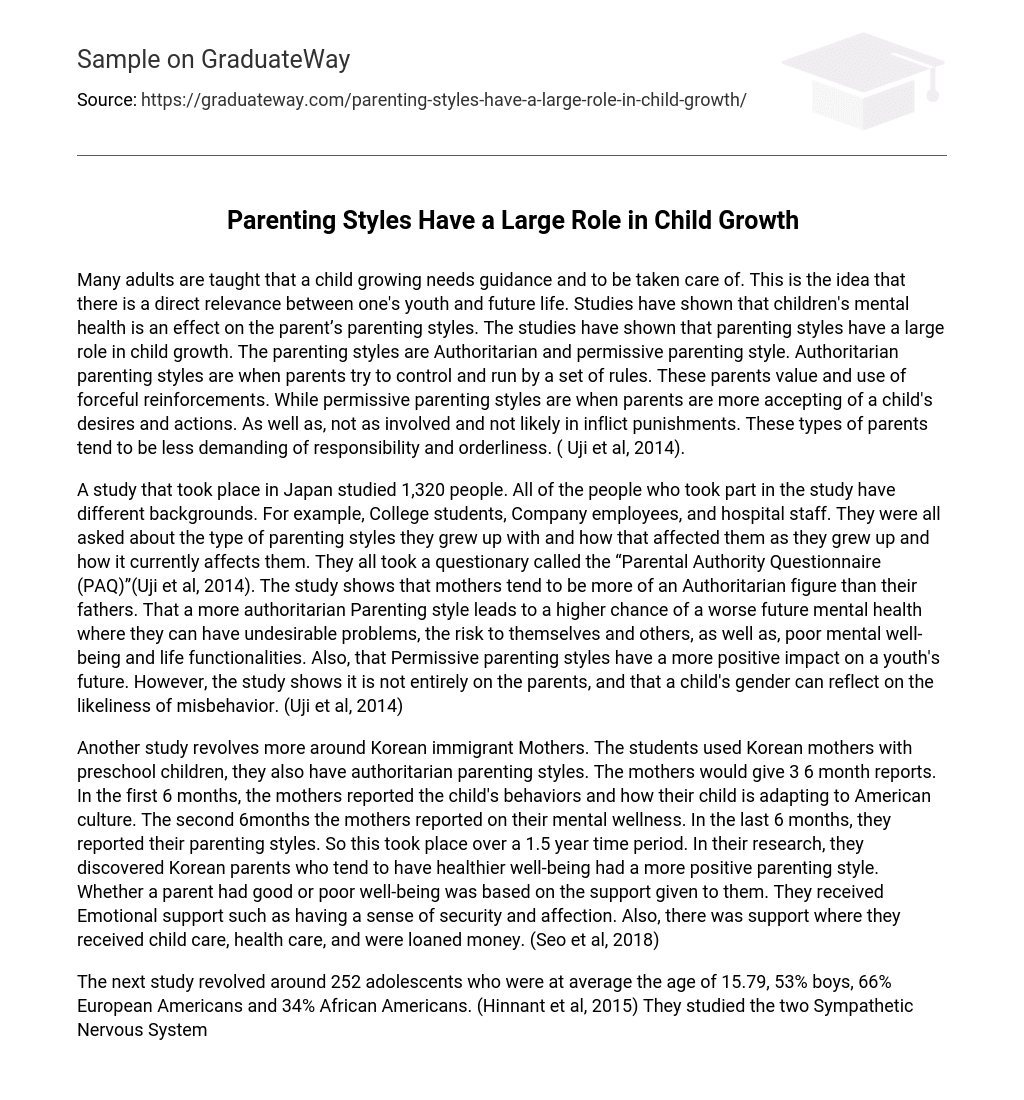Many adults are taught that a child growing needs guidance and to be taken care of. This is the idea that there is a direct relevance between one’s youth and future life. Studies have shown that children’s mental health is an effect on the parent’s parenting styles. The studies have shown that parenting styles have a large role in child growth. The parenting styles are Authoritarian and permissive parenting style. Authoritarian parenting styles are when parents try to control and run by a set of rules. These parents value and use of forceful reinforcements. While permissive parenting styles are when parents are more accepting of a child’s desires and actions. As well as, not as involved and not likely in inflict punishments. These types of parents tend to be less demanding of responsibility and orderliness. ( Uji et al, 2014).
A study that took place in Japan studied 1,320 people. All of the people who took part in the study have different backgrounds. For example, College students, Company employees, and hospital staff. They were all asked about the type of parenting styles they grew up with and how that affected them as they grew up and how it currently affects them. They all took a questionary called the “Parental Authority Questionnaire (PAQ)”(Uji et al, 2014). The study shows that mothers tend to be more of an Authoritarian figure than their fathers. That a more authoritarian Parenting style leads to a higher chance of a worse future mental health where they can have undesirable problems, the risk to themselves and others, as well as, poor mental well-being and life functionalities. Also, that Permissive parenting styles have a more positive impact on a youth’s future. However, the study shows it is not entirely on the parents, and that a child’s gender can reflect on the likeliness of misbehavior. (Uji et al, 2014)
Another study revolves more around Korean immigrant Mothers. The students used Korean mothers with preschool children, they also have authoritarian parenting styles. The mothers would give 3 6 month reports. In the first 6 months, the mothers reported the child’s behaviors and how their child is adapting to American culture. The second 6months the mothers reported on their mental wellness. In the last 6 months, they reported their parenting styles. So this took place over a 1.5 year time period. In their research, they discovered Korean parents who tend to have healthier well-being had a more positive parenting style. Whether a parent had good or poor well-being was based on the support given to them. They received Emotional support such as having a sense of security and affection. Also, there was support where they received child care, health care, and were loaned money. (Seo et al, 2018)
The next study revolved around 252 adolescents who were at average the age of 15.79, 53% boys, 66% European Americans and 34% African Americans. (Hinnant et al, 2015) They studied the two Sympathetic Nervous System (SNS) as a way to show that permissive parents did not lead to misbehavior or adolescents. The two are the Skin Conductance Level Reactivity (SCLR) and Cardiac Pre-ejection Period Reactivity (PEPR). (Hinnant et al, 2015) Less SNS reactivity shows that one is in an uncomfortable mental state. So those with less SNS reactivity are looking for more excitement which increases the reactivity to put the person in a more comfortable mental state. This research Shows that a permissive parenting style does not lead to misbehavior however it may increase the likeliness of the child to meet those who misbehave more. (Hinnant et al, 2015)
The final study revolves more around bullies. Bullies are those who intentionally and repeatedly hurt someone emotionally or physically. It is an act where the powerful attacks/abuse the less powerful. The study shows that there is an association with authoritarian parents, values, and bullying. They used 231 adolescents from 11 different schools in urban and rural areas. The participants would evaluate their Cultural values, Authoritarian parenting, and bullying. They evaluated these using the Cultural Value Scale (CVS), the Parental Authority Questionnaire (PAQ) and the Revised Bullying and Victimization Questionnaire (BVQ-R). (Georgiou et al, 2013) They show that Authoritarian Parenting Styles to lead to bullying as well as Victimization. However that Parenting style is not the only aspect that leads to bullying. (Georgiou et al, 2013)
However, some may argue that Authoritative parenting styles lead to misbehavior and adolescents. Adolescents grow from home conflicts and not having parents who can provide protection. (Piko et al, 2012) Also having parental protection and attention will draw children away from getting involved in risky situations and can better avoid meeting whose who already have misbehaving traits. (Piko et al, 2012)
Conclusion
Permissive parents are highly responsive and less demanding. They generally avoid giving limits to their children on what they can and can not do. This allows children to regulate their own behavior and make decisions for themselves. Permissive parenting is more lenient and raises their children on loose reins. They value one’s expression of individuality instead of fitting into societal norms. Permissive parenting style allows a child to make mistakes and learn from them, gain freedom, growing independence and create an emotional connection with their parents. Many Study has shown that Authoritarian parenting styles lead to a higher chance of misbehavior and adolescents then Authoritative parenting styles. However, many may argue that Authoritarian parenting styles lead to Misbehavior and adolescents. This is proven false due to all the questionnaires were given to adolescents and to Authoritarian parents, which shows that those with authoritarian households grow to be adolescents, poor mental health, and dependent on their family instead of themselves.





